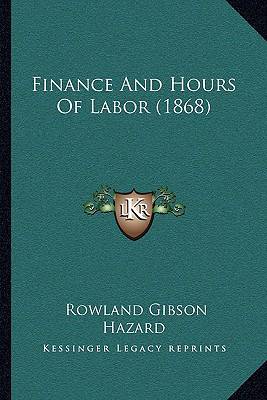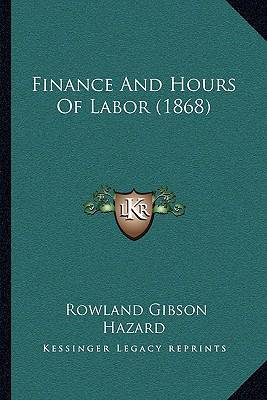
- Afhalen na 1 uur in een winkel met voorraad
- Gratis thuislevering in België vanaf € 30
- Ruim aanbod met 7 miljoen producten
- Afhalen na 1 uur in een winkel met voorraad
- Gratis thuislevering in België vanaf € 30
- Ruim aanbod met 7 miljoen producten
Zoeken
€ 25,95
+ 51 punten
Uitvoering
Omschrijving
""Finance And Hours Of Labor"" is a book written by Rowland Gibson Hazard, originally published in 1868. The book explores the relationship between finance and labor, specifically focusing on the impact of financial systems on the working hours of laborers. Hazard argues that the financial systems of the time were contributing to an unhealthy work-life balance for laborers, who were being forced to work long hours in order to earn a living wage. He suggests that a more equitable distribution of wealth and a rethinking of the financial system could lead to a more sustainable and just work environment. The book is a valuable historical document, shedding light on the economic and social conditions of the mid-19th century and offering insights into the ongoing struggle for workers' rights and fair labor practices.This scarce antiquarian book is a facsimile reprint of the old original and may contain some imperfections such as library marks and notations. Because we believe this work is culturally important, we have made it available as part of our commitment for protecting, preserving, and promoting the world's literature in affordable, high quality, modern editions, that are true to their original work.
Specificaties
Betrokkenen
- Auteur(s):
- Uitgeverij:
Inhoud
- Aantal bladzijden:
- 54
- Taal:
- Engels
Eigenschappen
- Productcode (EAN):
- 9781166416546
- Verschijningsdatum:
- 10/09/2010
- Uitvoering:
- Paperback
- Formaat:
- Trade paperback (VS)
- Afmetingen:
- 152 mm x 229 mm
- Gewicht:
- 86 g

Alleen bij Standaard Boekhandel
+ 51 punten op je klantenkaart van Standaard Boekhandel
Beoordelingen
We publiceren alleen reviews die voldoen aan de voorwaarden voor reviews. Bekijk onze voorwaarden voor reviews.











